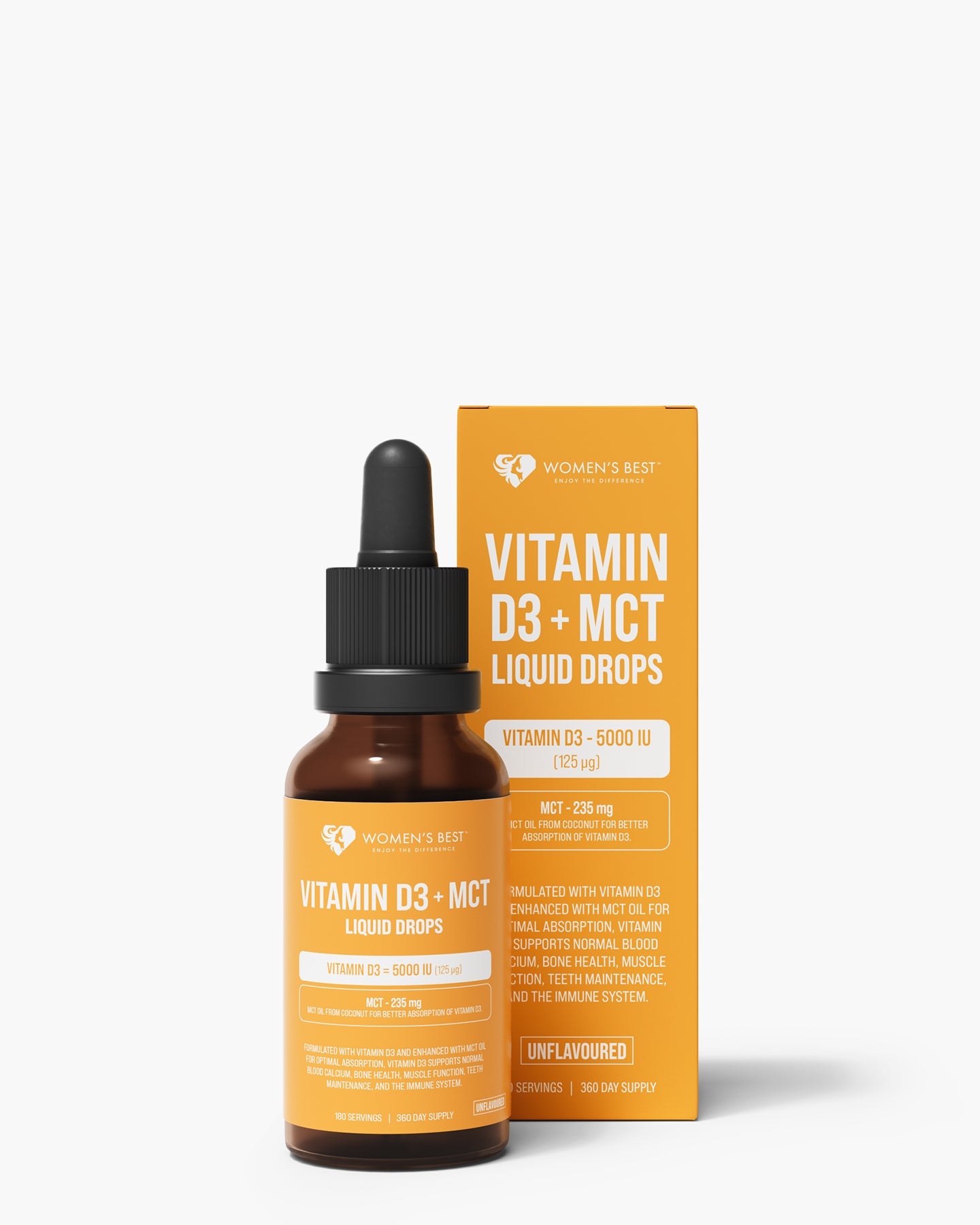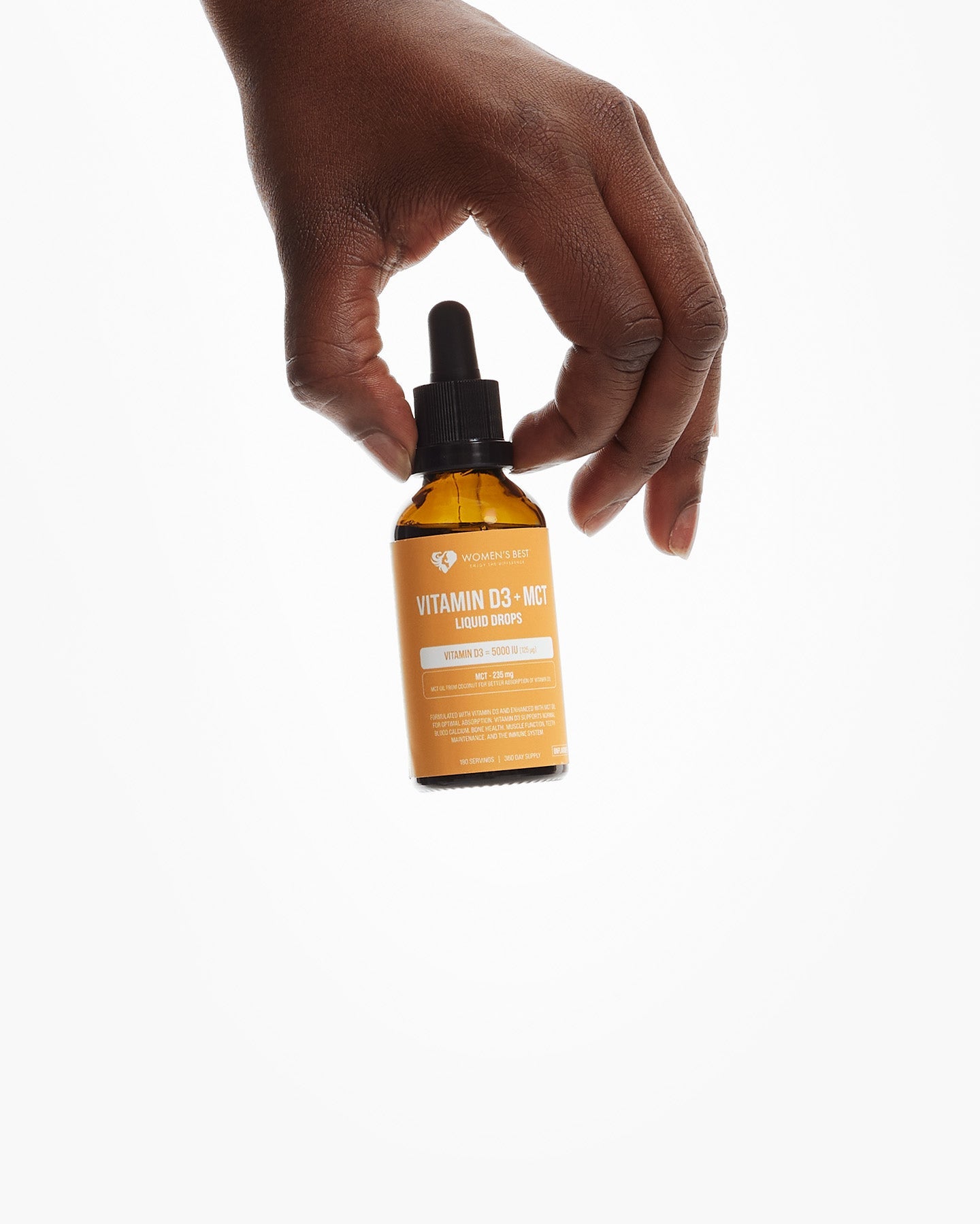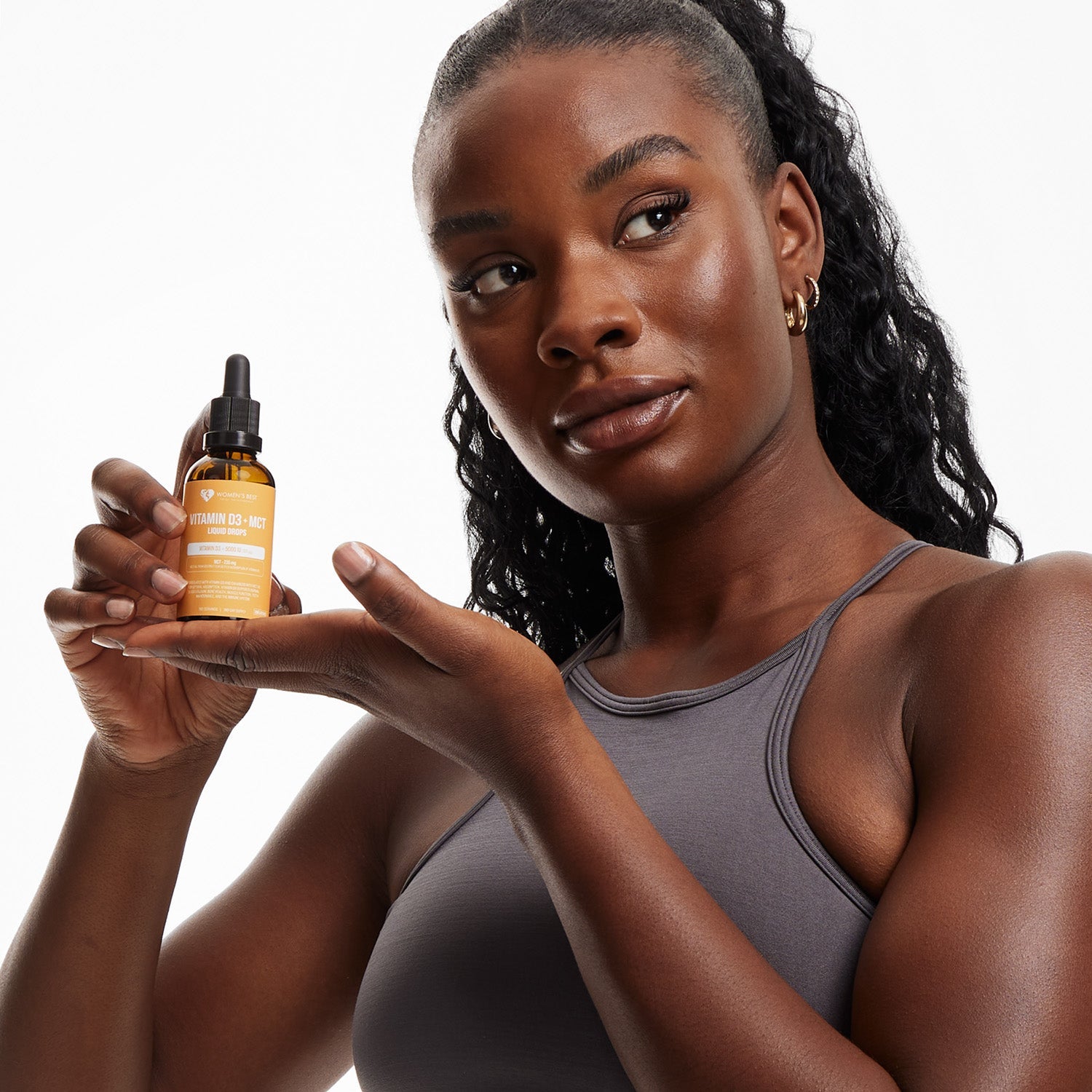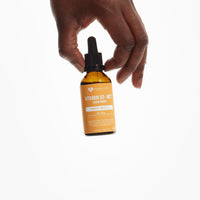
Your Shopping Cart
You may also like
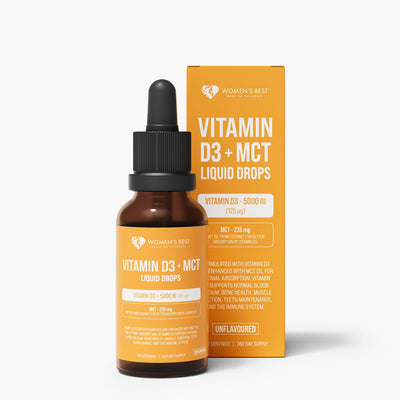


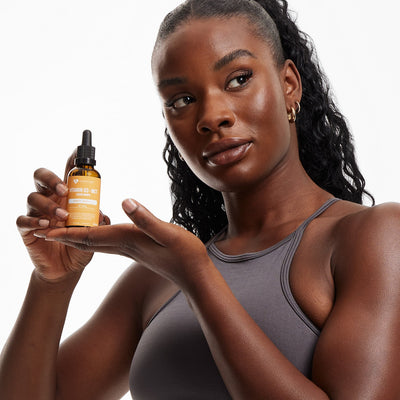



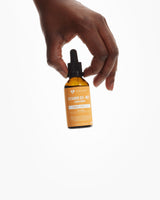


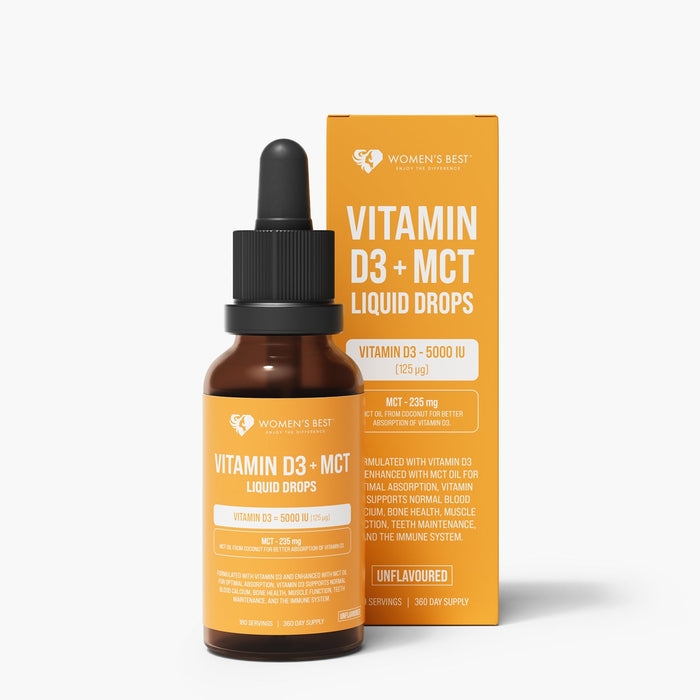


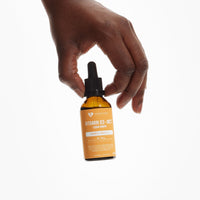


Vitamin D3 + MCT 5,000IU Liquid Drops
Vitamin D deficiency is widespread worldwide. Protect your health and help prevent various diseases with the sunshine vitamin D3. Includes high-quality coconut MCT oil for improved absorption.










- According to the National Health and Nutrition Examination Survey (NHANES), approximately 42% of the U.S. population suffers from vitamin D deficiency
- Severe vitamin D deficiency increases the risk of mood swings, depression, and fatigue, and is associated with serious illnesses such as cardiovascular disease and cancer
- Provides an easy-to-use, highly bioavailable form of vitamin D3
- Supports rapid replenishment of vitamin D stores
- 5,000IU (125mcg) of vitamin D3 per serving
- Contains 235mg of MCT oil, allowing it to be taken at any time, independently of meals
What are the benefits?
With the Women's Best Vitamin D3 + MCT Liquid Drops, we've developed a product that provides vital vitamin D at any time, thanks to the addition of coconut-derived MCT oil, allowing for easy intake without needing to coordinate with mealtimes. This product helps replenish your vitamin D stores effectively, all year round.
Vitamin D deficiency has become an increasing concern among health organizations worldwide. For example, the NHANES reports that approximately 42% of the U.S. population is affected. This concern has also become a frequent topic among our customers. We frequently receive questions from people living in sunny regions about whether they should only take vitamin D in winter, but experts emphasize that a deficiency can occur even in summer. Vitamin D production only occurs when the sun's UVB rays hit the skin at the correct angle, but this production stops if sunscreen is applied or the skin is covered. For this reason, many experts recommend year-round supplementation—not only to reduce the risk of skin cancer from sun exposure but also to avoid the serious consequences of vitamin D deficiency, such as mood swings, depression, fatigue, cardiovascular disease, and even cancer.
Why do we use 235mg MCT from coconuts per serving?
Vitamin D and K are fat-soluble vitamins, meaning they are best absorbed with fat. Fat acts as a carrier, helping to transport these vitamins to the intestines, where they can be effectively absorbed. For this reason, it is generally advisable to take these vitamins with a meal that includes fat, as insufficient fat can reduce the body’s ability to absorb them.
With the addition of MCT oil, our product allows vitamin D and K to be absorbed at any time, independent of meals. The MCT oil, derived from coconuts, is quickly absorbed by the body, enhancing the utilization of fat-soluble vitamins like D and K. This not only makes it easy and flexible to take but also ensures that the body can absorb the maximum amount of vitamin D and K efficiently, supporting optimal health benefits.
Our modern lifestyle limits Vitamin D.
Our modern lifestyle is a major contributor to vitamin D deficiency. Longer working hours indoors, limited time spent outside, and frequent use of sunscreen mean many people don’t get enough sunlight to produce sufficient vitamin D naturally. Diet alone cannot meet this need, as food provides only about 10–20% of the daily requirement.
For the body to produce vitamin D effectively, the sun needs to be positioned at an angle higher than 45 degrees in the sky, which typically occurs only around midday in both summer and winter. This means that it’s challenging to replenish your vitamin D levels efficiently if you aren't soaking up the midday sun.
A global vitamin D deficiency with health risks.
Research from around the world reveals that vitamin D deficiency is more widespread than previously thought, affecting significant portions of the global population. According to the NHANES, approximately 42% of the U.S. population suffers from vitamin D deficiency. In Canada, the deficiency rate is similar to that of Central Europe, affecting about 72% of the population. The Australian Bureau of Statistics (ABS) found that 23%, or one in four adults in Australia, are vitamin D deficient.
Why is this concerning? Insufficient vitamin D levels hinder the body’s ability to absorb adequate calcium, leading to the breakdown of calcium from the bones. This results in decreased bone stability and can cause conditions such as osteomalacia (soft bones) and rickets in children. In adults, a lack of vitamin D can increase the risk of bone fractures.
Recent studies have also indicated that persistently low vitamin D levels can elevate the risk of serious diseases, including Alzheimer's, heart disease, diabetes, and cancer. Conversely, maintaining optimal vitamin D levels promotes overall health by supporting mental well-being, heart health, blood circulation, sleep, and immune function. It also aids in reducing stress, maintaining bone health, and improving muscle function.
Supply your body with the sunshine vitamin. Simply and effectively.
With Women's Best Vitamin D3 + MCT drops, you can quickly and effectively absorb vitamin D3, no matter your lifestyle or location.
National Institutes of Health, Office of Dietary Supplements. (n.d.). Vitamin D: Fact sheet for consumers. U.S. Department of Health and Human Services. Retrieved [November 6, 2024], from https://ods.od.nih.gov/factsheets/VitaminD-Consumer/
EFSA (2012) Health Claims. Commission Regulation (EU) No 432/2012, http://data.europa.eu/eli/reg/2012/432/2024-08-19
Liu X, Baylin A, Levy PD. Vitamin D deficiency and insufficiency among US adults: prevalence, predictors and clinical implications. British Journal of Nutrition. 2018;119(8):928-936.
Australian Bureau of Statistics. (2011, December). Australian Health Survey: Biomedical Results for Nutrients. ABS. https://www.abs.gov.au/statistics/health/health-conditions-and-risks/australian-health-survey-biomedical-results-nutrients/latest-release.
Cashman, K. D., Dowling, K. G., Škrabáková, Z., Gonzalez-Gross, M., Valtueña, J., De Henauw, S., ... & Kiely, M. (2016). Vitamin D deficiency in Europe: pandemic?. The American journal of clinical nutrition, 103(4), 1033-1044.
Schwalfenberg, G. K., Genuis, S. J., & Hiltz, M. N. (2010). Addressing vitamin D deficiency in Canada: a public health innovation whose time has come. Public health, 124(6), 350–359.
Cesar de Oliveira, Vasant Hirani, Jane P Biddulph, Associations Between Vitamin D Levels and Depressive Symptoms in Later Life: Evidence From the English Longitudinal Study of Ageing (ELSA), The Journals of Gerontology: Series A, Volume 73, Issue 10, October 2018, Pages 1377–1382.
Kheiri, B., Abdalla, A., Osman, M., Ahmed, S., Hassan, M., & Bachuwa, G. (2018). Vitamin D deficiency and risk of cardiovascular diseases: A narrative review. Clinical Hypertension, 24, 9.
How do I take it?
With 235mg of high-quality MCT oil per serving, vitamin D3 is absorbed effectively. You can take the product at any time, even without a meal. If the pipette is not completely filled, you can simply take 16 drops instead.
Ingredients

You may also like
How is vitamin D3 formed?
Vitamin D is a prohormone that, unlike many other vitamins, is converted in the body into an essential hormone that regulates cell function and numerous bodily processes. Our body can only produce vitamin D with the help of UVB radiation from the sun, as vitamin D is rarely found in food sources. When UVB radiation hits our skin, the body begins synthesizing vitamin D.
However, due to intense UV radiation, it's crucial to apply high-quality sunscreen to prevent the risk of sunburn or skin cancer. The challenge is that sunscreen or clothing can block the vitamin D synthesis process. Additionally, some countries are located at latitudes where less UVB radiation reaches them. For this reason, supplementation is recommended to ensure an optimal supply of vitamin D.

Dynamic duo.
Optimal absorption with MCT oil, anytime.
Vitamin D is fat-soluble, so it is best absorbed with fat. That’s why our drops contain 235mg of high-quality MCT oil, which boosts absorption of vitamin D3 and allows for convenient use, even without a meal.
MCTs (medium-chain triglycerides) provide a quick, healthy energy source that’s rapidly metabolized. Unlike vegetable oils with long-chain fatty acids, MCT oil offers an immediate energy boost and supports well-being, performance, weight management, and immunity.
These medium-chain fats, though rare in most foods, are especially beneficial because the body can easily convert them into energy. Unlike long-chain fats, MCTs are not stored in fat cells, positively impacting energy balance, metabolism, and fat burning.
Rial, S. A., Karelis, A. D., Bergeron, K. F., & Mounier, C. (2016). Gut Microbiota and Metabolic Health: The Potential Beneficial Effects of a Medium Chain Triglyceride Diet in Obese Individuals. Nutrients, 8(5), 281.
St-Onge, M. P., Mayrsohn, B., O'Keeffe, M., Kissileff, H. R., Choudhury, A. R., & Laferrère, B. (2014). Impact of medium and long chain triglycerides consumption on appetite and food intake in overweight men. European journal of clinical nutrition, 68(10), 1134-1140.
Han, J. R., Deng, B., Sun, J., Chen, C. G., Corkey, B. E., Kirkland, J. L., Ma, J., & Guo, W. (2007). Effects of dietary medium-chain triglyceride on weight loss and insulin sensitivity in a group of moderately overweight free-living type 2 diabetic Chinese subjects. Metabolism: clinical and experimental, 56(7), 985–991.
Nikooei, P., Hosseinzadeh-Attar, M. J., Asghari, S., Norouzy, A., Yaseri, M., & Vasheghani-Farahani, A. (2021). Effects of virgin coconut oil consumption on metabolic syndrome components and asymmetric dimethylarginine: A randomized controlled clinical trial. Nutrition, metabolism, and cardiovascular diseases : NMCD, 31(3), 939–949.

Vitamin D3 & MCTs. Scientifically proven.
Scientific studies and the European Food Safety Authority (EFSA) confirm that vitamin D3 offers a wide range of health benefits. Vitamin D3 aids the body in absorbing and utilizing calcium, which is essential for strong bones and teeth. Additionally, vitamin D strengthens the immune system and helps maintain muscle function.
MCT oil provides instant energy, improves gut health, supports weight loss, and helps reduce risk factors for heart disease, such as weight, cholesterol levels, and inflammation.
EFSA (2012) Health Claims. Commission Regulation (EU) No 432/2012, http://data.europa.eu/eli/reg/2012/432/2024-08-19
Martens, P. J., Gysemans, C., Verstuyf, A., & Mathieu, C. (2020). Vitamin D’s effect on immune function. Nutrients, 12(5), 1248.
Shah, N. D., & Limketkai, B. N. (2017). The use of medium-chain triglycerides in gastrointestinal disorders. Practical Gastroenterology, 160, 20-25.
Rial, S. A., Karelis, A. D., Bergeron, K. F., & Mounier, C. (2016). Gut Microbiota and Metabolic Health: The Potential Beneficial Effects of a Medium Chain Triglyceride Diet in Obese Individuals. Nutrients, 8(5), 281.
St-Onge, M. P., Mayrsohn, B., O'Keeffe, M., Kissileff, H. R., Choudhury, A. R., & Laferrère, B. (2014). Impact of medium and long chain triglycerides consumption on appetite and food intake in overweight men. European journal of clinical nutrition, 68(10), 1134-1140.
Han, J. R., Deng, B., Sun, J., Chen, C. G., Corkey, B. E., Kirkland, J. L., Ma, J., & Guo, W. (2007). Effects of dietary medium-chain triglyceride on weight loss and insulin sensitivity in a group of moderately overweight free-living type 2 diabetic Chinese subjects. Metabolism: clinical and experimental, 56(7), 985–991.
Nikooei, P., Hosseinzadeh-Attar, M. J., Asghari, S., Norouzy, A., Yaseri, M., & Vasheghani-Farahani, A. (2021). Effects of virgin coconut oil consumption on metabolic syndrome components and asymmetric dimethylarginine: A randomized controlled clinical trial. Nutrition, metabolism, and cardiovascular diseases: NMCD, 31(3), 939–949.

The role of D3 in calcium metabolism.
Vitamin D is essential for calcium metabolism and bone health. It promotes calcium absorption in the intestines and regulates blood calcium levels, which are crucial for muscle function and nerve conduction. Additionally, it supports the deposition of calcium and phosphate in bones, helping maintain a strong and resilient bone structure. A deficiency in Vitamin D3 can impair calcium utilization, increasing the risk of brittle or soft bones.
Norman, A. W. (2008). From vitamin D to hormone D: fundamentals of the vitamin D endocrine system essential for good health. The American journal of clinical nutrition, 88(2), 491S-499S.

Our quality promise.
We take quality seriously, and our Women's Best Vitamin D3 + MCT 5,000IU Liquid Drops are manufactured to the strictest standards in Germany. Each batch undergoes rigorous testing to ensure it meets our high standards when it comes to quality and effectiveness.

| Vitamin D3 + K2 + MCT Liquid Drops (2,000 IU) | Vitamin D3 + K2 + MCT Liquid Drops (5,000 IU) | Vitamin D3 + K2 + MCT Liquid Drops (10,000 IU) | Vitamin D3 + MCT Liquid Drops (2,000 IU) | Vitamin D3 + MCT Liquid Drops (5,000 IU) | |
 |
 |
 |
 |
 |
|
| Source/or/Origin | Germany | Germany | Germany | Germany | Germany |
| Enhanced D3 utilization thanks to K2 | Yes | Yes | Yes | No | No |
| Guaranteed absorption with MCT oil | Yes | Yes | Yes | Yes | Yes |
| Vitamin D3 per serving | 2,000 IU (50mcg) | 5,000 IU (125mcg) | 10,000 IU (250mcg) | 2,000 IU (50mcg) | 5,000 IU (125mcg) |
| Vitamin K2-MK7 per serving | 50mcg | 125mcg | 125mcg | ➖ | ➖ |
| Under the most stable form: K2VITAL® | ➖ | ➖ | |||
| MCT per serving | 470 mg | 470 mg | 470 mg | 235mg | 235mg |
| Supports immune health | |||||
| Promotes cell division | |||||
| Supports bone health | |||||
| Improves mood | |||||
| Supports cardiovascular health | |||||
| Enhances performance | |||||
| Neutral taste |
You may also like
